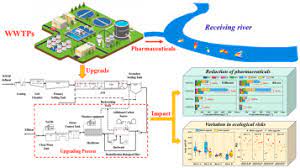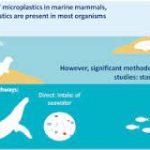Effluents from wastewater treatment plants wield a dual-edged sword: Some species vanish, while others thrive. Particularly, specific insect orders, including stonefly and caddisfly larvae, face decimation. In contrast, certain worms and crustaceans experience population growth. Treated wastewater exerts an impact on our rivers. A team from Goethe University Frankfurt, led by Daniel Enns and Dr. Jonas Jourdan, has substantiated these findings in a comprehensive study, now published in the esteemed journal Water Research. Their research examined 170 wastewater treatment plants in Hesse, delving into their influence on species composition.

The Role of Wastewater Treatment Plants in Modern Infrastructure
Wastewater treatment plants are an indispensable component of our contemporary infrastructure, significantly enhancing the quality of our surface waters. Nevertheless, their capacity to completely eliminate micropollutants from wastewater remains limited. These micropollutants encompass active ingredients from pharmaceuticals, personal care products, pesticides, and other synthetic substances that infiltrate water bodies via treated wastewater, exacerbating the burden on rivers and streams. This compounds the challenges faced by already vulnerable insect communities and aquatic fauna. Previous studies, primarily centred on individual wastewater treatment plants, have consistently revealed that invertebrate communities downstream of these effluents are predominantly composed of pollution-tolerant species.
Ubiquitous Impact of Wastewater
Until now, the ubiquity of these changes remained unclear. Therefore, a team of biologists from Goethe University Frankfurt conducted an extensive examination of how wastewater from 170 wastewater treatment plants in Hesse affects invertebrate species composition. This research has shifted the conventional understanding of human-induced stressors as solely reducing species numbers and diversity. Instead, the findings suggest a significant shift in species composition. Researchers have identified notable changes in the species community’s makeup between sites located upstream and downstream of wastewater treatment plants. Certain species, such as stoneflies and caddisfly larvae, are significantly impacted and have disappeared entirely in some regions. In contrast, other taxa, such as certain worms and crustaceans, thrive, exhibiting increased numbers. This transformation is particularly observable in smaller streams and rivers. Collectively, wastewater treatment plants modify downstream conditions, favouring pollution-tolerant species and disadvantaging sensitive ones.
Mitigating Water Pollution: Call to Action
Addressing water pollution necessitates modern treatment techniques such as ozonation or activated charcoal filtering, which enhance the efficiency of wastewater treatment plants. This allows for the removal of a wider spectrum of pollutants, including numerous trace substances, before releasing wastewater into the environment. Additionally, consolidating smaller wastewater treatment plants can alleviate the environmental burden. Regardless of the approach taken, it’s crucial to ensure that upstream sections remain free from degradation, maintaining good chemical and structural conditions.
In conclusion, wastewater treatment plants play a pivotal role in our environmental ecosystem, shaping the delicate balance of aquatic life. Recognizing their far-reaching impact and implementing effective measures to reduce their ecological footprint are essential steps toward safeguarding our rivers and streams.
For more information read this article: https://www.newswise.com/articles/even-treated-wastewater-affects-our-rivers
Read our previous articles: Utilizing 239 Million-Year-Old Fossils to Enhance the Search for Martian Aliens
https://scitechupdate.com/index.php/android-14-satellite-sms-for-everyone/
https://scitechupdate.com/index.php/chemistry-entrepreneurship/
https://scitechupdate.com/index.php/waste-paper-to-battery-components-for-smarts-phones-vehicles/https://scitechupdate.com/index.php/ai-demonstrated-95-accuracy-in-listening-typing-and-data-processing/
https://scitechupdate.com/index.php/top-7-technology-trends-of-2023-from-ai-to-5d-technology/

